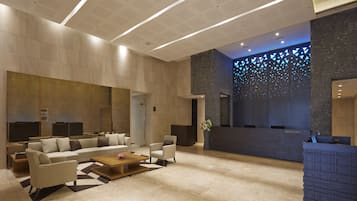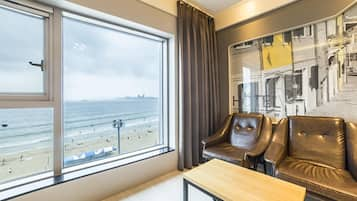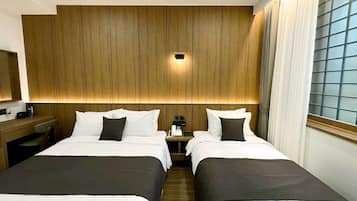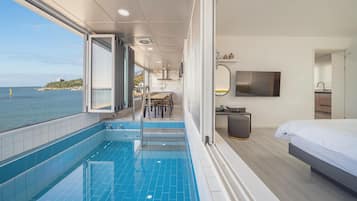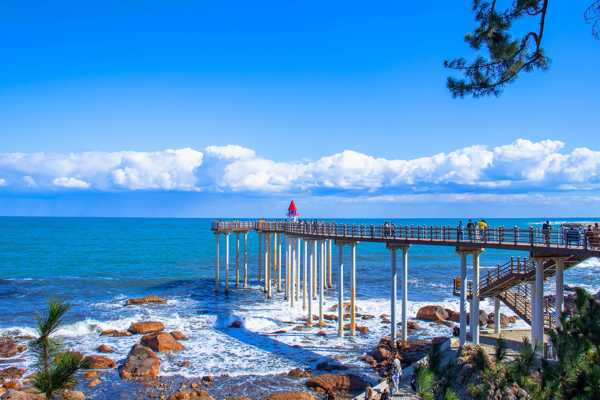Pohang is a coastal city where you can find many attractive beaches along the east coast. There are 6 designated beaches including Wolpo Beach, Chilpo Beach, Yeongildae Beach, Dogu Beach, and Guryongpo Beach, and 14 large and small beaches including Hwajin Beach, Yonghan 1-ri Beach, Sinchang Beach, and Samjeong Beach. With unmapped or unnamed beaches included, there are many more beaches you can choose from.
At Guryongpo Beach, where a legend about nine dragons (“guryong”) that ascended to heaven has been passed down, watch the sunrise and taste gwamegi, a representative local food. You can admire the seascape walking along the Green Coastal Road that connects Chilpo Beach and Odo-ri, and on top of the Haeoreum Observatory. Yonghan-ri Beach near Yeongil New Port is famous as a surfers' paradise, where you can learn and enjoy surfing. Dogu Beach is a popular picnic spot for families and couples. When the lights are turned on around Pohang New Port, the beach is transformed into a fantastic night view spot. Sinchang Beach is a small-sized beach that attracts many family vacationers who want to enjoy sea bathing in an easy and safe way. Don't miss watching the sunrise at Ilchuram Rock, which is one of the 10 most scenic views of the Joseon Dynasty.
- 1
Guryongpo Beach
White sandy beach that offers respite from city life

- Economía
- Familias
- Fotos
Guryongpo Beach is a beach with shallow water where anyone, regardless of age, can have a great time safely. The 50-metre wide white sandy beach stretching some 400 metres can accommodate around 1,000 vacationers. The jade-coloured sea and the fine white sand create a superb view, attracting many summer vacationers. On the map of the Korean Peninsula, which resembles a tiger, the beach sits under the Homigot Cape that represents the tiger's tail, and Yeongilman Bay that looks like a lake. For this reason, the beach is very popular with those who want to see the beautiful coastal scenery and the splendid sunrise at Yeongilman Bay.
Guryongpo is a hilly area with little flat land, so winters are not too cold and summers are cool. According to the legend from which the name of the beach originated (“guryong” meaning “nine dragons”), out of ten dragons that tried to ascend to heaven from here, nine succeeded and one fell onto the ground, to form the present landform of the area. You can easily find the motif of dragons at the entrance to the village, along with the museum and memorial hall. Half-dried saury (gwamegi) is a representative local food that you must try. Steamed bun (jjinppang), a popular snack kneaded by hands with a 70-year history, has a chewy mouthfeel and a plain taste.
Ubicación: 6, Homi-ro 426beon-gil, Guryongpo-eup, Nam-gu, Pohang-si, Gyeongsangbuk-do, South Korea
Teléfono: +82 (0)54-270-6225
Mapafoto por emailer (CC BY-SA 2.0) modificada
- 2
Chilpo Beach
Experience sports and performing arts at the beach

- Economía
- Familias
- Fotos
Chilpo Beach is close to downtown Pohang and has various types of accommodations, which makes it a popular beach with family tourists. The beach has the largest foreshore in Pohang, which measures 2 km in length and 70 metres in width, but its water is only 1 metre deep. The sand has relatively large grains, making it easy to build sand castles and take sand baths.
You can also see a lot of people enjoying sea fishing on the nearby sea rocks. The beach is a popular spot for enjoying marine sports such as windsurfing. It is one of few beaches where windsurfing is available in Korea. Unpack at the auto camping site close to the beach and enjoy paragliding on Gonnyunsan Mountain. What makes summer on this beach more special is the Chilpo Jazz Festival that is held every year. Immerse yourself in the great jazz music played by top Korean jazz performers, watching the night sea that subtly glows in the dark orange hue of the sunset.
Ubicación: Chilpo-ri, Heunghae-eup, Buk-gu, Pohang-si, Gyeongsangbuk-do, South Korea
Mapafoto por Waegook Travel: Fun Trips in Korea (CC BY-SA 2.0) modificada
- 3
Yonghan 1-ri Beach
Surfers' paradise with crystal clear water

- Aventura
- Familias
- Fotos
Yonghan 1-ri Beach is a beautiful white sandy beach that stretches between Yeongilmanhang-ro Road Pass and Pohang New Port Breakwater. Along with Yangyang Beach in Gangwon-do and Songjeong Beach in Busan, it is one of the top three surfing spots in Korea that attracts surfers from all over the country. From the nearby breakwater, you can take a picture or film surfers riding the waves. Every year, the beach is visited by 20,000 to 30,000 people who come to enjoy sea bathing and surfing. Yonghan Surfy Beach, which was recently created by the city, has established itself as the nation's best surfing facility.
There is a 6-lane round-trip road next to the beach. If you want to enjoy car camping, you can park your car on the beach towards the open sea, or you can just stop by to appreciate the seascape. Take a walk along the deck of the Yeongilman Haeoreum Trail and feel refreshed looking out at the turquoise sea and the surrounding natural scenery. You can also admire the view of the ocean from top of Yonghan-ri Hill, which is located 600 metres north of the beach and overlooks the bay.
Ubicación: Yonghan-ri, Heunghae-eup, Buk-gu, Pohang-si, Gyeongsangbuk-do, South Korea
Mapafoto por Choi2451 (CC BY-SA 4.0) modificada
- 4
Sinchang Beach
Picturesque spot for family holidays

- Aventura
- Familias
- Fotos
Sinchang Beach, located in Janggi-myeon, south of Guryongpo, is a place where you can enjoy water activities, fishing, and various experiential programmes with your family. The white sandy beach that stretches along the coastline in front of the village is full of fine sand and pebbles, making it a great place to enjoy swimming. The beach is also a popular car camping ground, equipped with various convenient facilities such as restaurants and rest rooms.
Ilchuram Rock, standing where the fresh water of Janggicheon Stream and the seawater from the East Sea meet, has also been called “Nalmulchi” or “Saengsuam,” because of a mineral spring found around the rock. Praised as one of the 10 most scenic views of the Joseon Dynasty by modern Korean historian Yukdang Choi Nam-seon, the beach is famous as a sunrise viewing spot. The majestic pine trees growing on top of the rocks, like a hero who has overcome adversity, have a triumphant air. The nearby fishing village operates various experiential programmes, among which cage fishing, transparent canoe riding, and fish catching with bare hands are popular. Find a spot where freshwater and seawater meet and spend some fun time with your family catching fish, crabs, and conches.
Ubicación: Sinchang-ri, Janggi-myeon, Nam-gu, Pohang-si, Gyeongsangbuk-do, South Korea
Mapa - 5
Wolpo Beach
Beach embraced by pure nature
- Familias
- Fotos
Wolpo Beach has a long white sandy beach and clear and shallow water, which makes it a popular natural resort for families. Wolpo-ri, a village spontaneously formed along the coast, is equipped with convenient facilities for vacationers such as restaurants, shops, and B & Bs, and the surrounding campground is spacious and neat. As the beach can be easily reached, many young people visit to enjoy windsurfing. The sea, located where cold and warm currents intersect, is rich in zooplankton and fish, drawing many fishing enthusiasts to the beach to enjoy sea fishing.
During the Goryeo Dynasty, Samjeong Beach served as a military base to defend against Japanese invasions, and various forms of folk games have been passed down in the area. Take a walk on the beach and watch the sunset against the background of the red lighthouse seen in the distance at Lara Coffee, a cafe located at the end of the beach. The Wolpo Rock Festival, which kicked off in 2016 and has been held every summer, features famous Korean rock bands and artists who fill the midsummer night with great rock performances. Release your passionate self and enjoy the exciting rock festival to the fullest.
Ubicación: Wolpo-ri, Cheongha-myeon, Buk-gu, Pohang-si, Gyeongsangbuk-do, South Korea
Mapa - 6
Hwajin Beach
Cosy beach at the end of Course 18 of the Haeparang Trail
- Economía
- Familias
- Fotos
Hwajin Beach, located below the Hwajin Service Area at the northern end of Pohang, is a cosy little beach with a pine forest and a stream flowing behind. The 100-metre-wide white sandy beach stretches some 400 metres. Its clear waters and campsite in the pine forest attract many campers from across the nation. Located about an hour and a half away from Daegu, the beach is also an ideal picnic destination for families who want the view of both the sea and the forest. During the summer vacation season, various events held on the beach, such as a shellfish catching event, a fireworks festival, and a music festival, add to the excitement of the trip.
Hwajin-ri, the end point of the 18th course of the Haeparang Trail, consists of Gujin Village and Daejin Village on the seaside, and Hwajin Village on the inland side. Gujin Village was named after a turtle-shaped rock on the seashore in front of the village, and the name of Hwasan Village was inspired by many sweetbriers near the white sandy beach on the east side of the village. Bogyeongsa Temple and Naeyeonsan Mountain, the nearby tourist attractions, scenic spots, are one of the three most scenic spots in Gyeongsangbuk-do. Visit these places as well and experience many historical and natural attractions.
Ubicación: Jigyeong-ri, Songna-myeon, Buk-gu, Pohang-si, Gyeongsangbuk-do, South Korea
Mapa - 7
Dogu Beach
Place where the legend of Yeonorang and Seonyeo was born
- Economía
- Familias
- Fotos
Dogu Beach, a bow-shaped beach located at the southern corner of Yeongilman Bay, is an attractive beach featuring a peaceful and beautiful seascape. The beach is believed to be the place where Yeonorang and Seonyeo, a couple in a Korean legend, departed for Japan across the sea. As the parking lot is located right in front of the beach, you will feel like jumping into the sea as soon as you park. The 800-metre-long white sandy beach has an unusually large number of seashells, standing with its old reputation as a popular clam catching spot. The exotic atmosphere created by the white sandy beach shaded by palm trees is something rarely found on the east coast.
Watching people windsurfing in the sea breeze will make you feel like you're on a foreign beach. Dogu Beach is also a popular car camping spot, providing a convenient parking lot, various amenities, and a beautiful view of the ocean. The massive POSCO plant, a landmark of Pohang seen over the sea, boasts its splendour on the horizon during the day, while it creates an even more fantastic view at night.
Ubicación: 729, Dogu-ri, Donghae-myeon, Nam-gu, Pohang-si, Gyeongsangbuk-do, South Korea
Teléfono: +82 (0)54-270-6224
Mapa - 8
Samjeong Beach
Appreciate beautiful scenery at a leisurely pace
- Economía
- Familias
- Fotos
Samjeong Beach, located very close to Guryongpo Beach, is also called Samjeong 1-ri Beach. The water flowing from the valley in the east of the village used to meet the sea here and frequently flooded, so the beach was once called “Beomjin,” meaning a “flooded area.” The fine sand and small pebbles spread out on the white sandy beach, and the murmuring sound of the pebbles washed by the waves will bring peace to your mind. When you immerse yourself in the sea, you can feel that the water is warm on the surface but the temperature varies greatly depending on the depth. If you look down into the water wearing goggles, you will see haze rising from the bottom of the sea. At the southern end of the beach, you can observe columnar joints. The columnar joints seen from the rough rocky coast are as dynamic as volcanic lava soaring to the sky.
Samjeong Beach is known to have more saury drying fields than in other places in Guryongpo, a main producer of half-dried saury. Called “gwamegi” by locals, the half-dried saury is a must-try specialty of the region. Gwamegi is made by drying saury in the sea breeze, which replaced herring in recent years. On Samjeong Island, stop by Cafe Point, where you can appreciate a wonderful view of the ocean. The cafe has numerous photo zones where you can take terrific photos.
Ubicación: Samjeong-ri, Guryongpo-eup, Nam-gu, Pohang-si, Gyeongsangbuk-do, South Korea
Mapa




